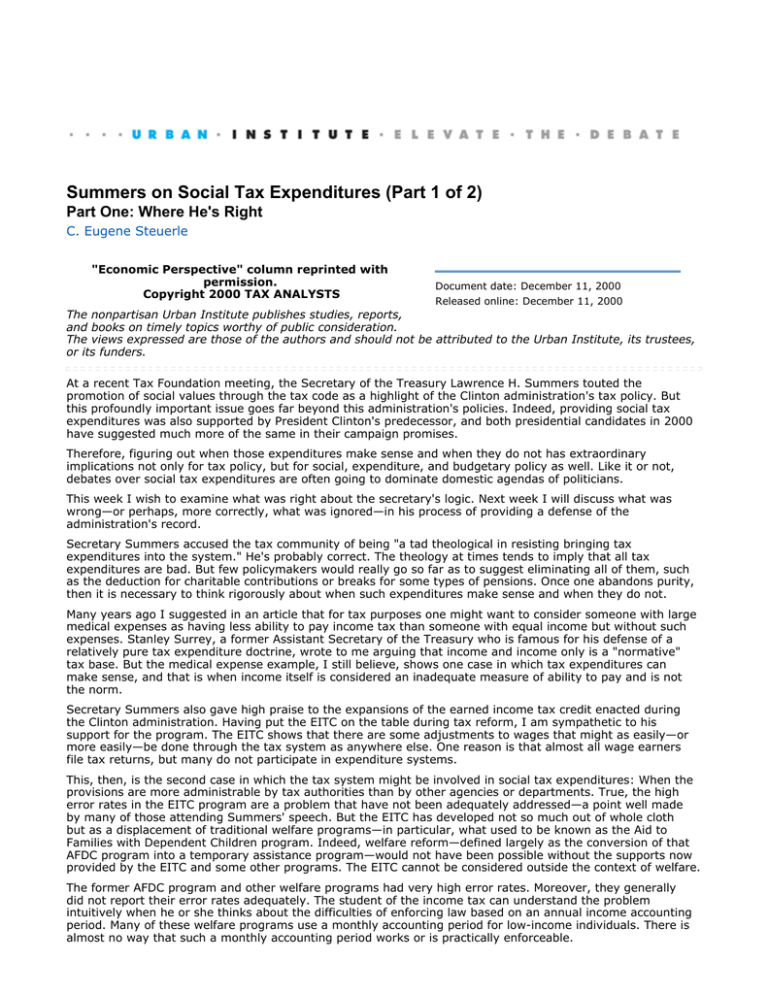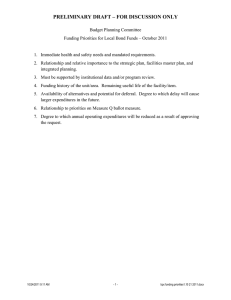Summers on Social Tax Expenditures (Part 1 of 2)
advertisement

Summers on Social Tax Expenditures (Part 1 of 2) Part One: Where He's Right C. Eugene Steuerle "Economic Perspective" column reprinted with permission. Copyright 2000 TAX ANALYSTS Document date: December 11, 2000 Released online: December 11, 2000 The nonpartisan Urban Institute publishes studies, reports, and books on timely topics worthy of public consideration. The views expressed are those of the authors and should not be attributed to the Urban Institute, its trustees, or its funders. At a recent Tax Foundation meeting, the Secretary of the Treasury Lawrence H. Summers touted the promotion of social values through the tax code as a highlight of the Clinton administration's tax policy. But this profoundly important issue goes far beyond this administration's policies. Indeed, providing social tax expenditures was also supported by President Clinton's predecessor, and both presidential candidates in 2000 have suggested much more of the same in their campaign promises. Therefore, figuring out when those expenditures make sense and when they do not has extraordinary implications not only for tax policy, but for social, expenditure, and budgetary policy as well. Like it or not, debates over social tax expenditures are often going to dominate domestic agendas of politicians. This week I wish to examine what was right about the secretary's logic. Next week I will discuss what was wrong—or perhaps, more correctly, what was ignored—in his process of providing a defense of the administration's record. Secretary Summers accused the tax community of being "a tad theological in resisting bringing tax expenditures into the system." He's probably correct. The theology at times tends to imply that all tax expenditures are bad. But few policymakers would really go so far as to suggest eliminating all of them, such as the deduction for charitable contributions or breaks for some types of pensions. Once one abandons purity, then it is necessary to think rigorously about when such expenditures make sense and when they do not. Many years ago I suggested in an article that for tax purposes one might want to consider someone with large medical expenses as having less ability to pay income tax than someone with equal income but without such expenses. Stanley Surrey, a former Assistant Secretary of the Treasury who is famous for his defense of a relatively pure tax expenditure doctrine, wrote to me arguing that income and income only is a "normative" tax base. But the medical expense example, I still believe, shows one case in which tax expenditures can make sense, and that is when income itself is considered an inadequate measure of ability to pay and is not the norm. Secretary Summers also gave high praise to the expansions of the earned income tax credit enacted during the Clinton administration. Having put the EITC on the table during tax reform, I am sympathetic to his support for the program. The EITC shows that there are some adjustments to wages that might as easily—or more easily—be done through the tax system as anywhere else. One reason is that almost all wage earners file tax returns, but many do not participate in expenditure systems. This, then, is the second case in which the tax system might be involved in social tax expenditures: When the provisions are more administrable by tax authorities than by other agencies or departments. True, the high error rates in the EITC program are a problem that have not been adequately addressed—a point well made by many of those attending Summers' speech. But the EITC has developed not so much out of whole cloth but as a displacement of traditional welfare programs—in particular, what used to be known as the Aid to Families with Dependent Children program. Indeed, welfare reform—defined largely as the conversion of that AFDC program into a temporary assistance program—would not have been possible without the supports now provided by the EITC and some other programs. The EITC cannot be considered outside the context of welfare. The former AFDC program and other welfare programs had very high error rates. Moreover, they generally did not report their error rates adequately. The student of the income tax can understand the problem intuitively when he or she thinks about the difficulties of enforcing law based on an annual income accounting period. Many of these welfare programs use a monthly accounting period for low-income individuals. There is almost no way that such a monthly accounting period works or is practically enforceable. A third area cited by Summers was in the field of education. It is important here to note that most educational spending already receives consumption rather than income tax treatment—that is, the spending generally is not taxable to individuals. The public spending on primary and secondary education, as well as much of the assistance from public universities, is not treated as taxable income by individuals. Training within businesses, in turn, is usually excluded from the employee's income and immediately deducted by the business even though a capital investment likely to produce future returns to the individual and the business is being made. Thus, almost all education and training is favored by the tax system even before consideration is given to providing tax benefits to educational expenditures made by individuals out of their after-tax income. If the tax expenditure budget were expanded as it should be, it would report such items as the nontaxability of those public benefits as tax expenditures. (The budget includes other nontaxable items but for some reason has always been negligent when it comes to education.) Yet, once again, I doubt that many—even Stanley Surrey, were he alive—would propose to tax those public benefits. They might oppose the extension of such benefits to other items of educational and training expenses, but a consistency problem then arises. The favorable treatment of educational expenditures has a close relationship to the favorable treatment of pensions. In both cases, some effort is made to promote saving, at least up to some level. Without going into details here, a good efficiency and equity case can be made for the taxation, especially of low and moderate income individuals, on the basis of their consumption rather than income. Finally, returning to the case of charitable contributions, as cited by the secretary, here is an example of a tax expenditure that supports several policy standards: efficiency in promoting charitable giving, some justification on the basis of ability for adjusting the tax base to count income after contributions are made, and simpler administration by tax authorities of charitable contributions than by some new Department of Charity. Thus, looking through the items cited by Summers, it is apparent that he concentrated his examples in areas in which a case might be made on at least one of several standards: equity adjustments in defining ability to pay or an alternative (e.g., consumption) tax base, ease of administration if done by the tax authorities, and efficiency in promoting some worthy social objective. I don't mean to imply that such justifications should open up the tax code like a Pandora's box, only that there are some standards that can justify use of the tax system to promote social spending. Other Publications by the Authors C. Eugene Steuerle Usage and reprints: Most publications may be downloaded free of charge from the web site and may be used and copies made for research, academic, policy or other non-commercial purposes. Proper attribution is required. Posting UI research papers on other websites is permitted subject to prior approval from the Urban Institute—contact publicaffairs@urban.org. If you are unable to access or print the PDF document please contact us or call the Publications Office at (202) 261-5687. Disclaimer: The nonpartisan Urban Institute publishes studies, reports, and books on timely topics worthy of public consideration. The views expressed are those of the authors and should not be attributed to the Urban Institute, its trustees, or its funders. Copyright of the written materials contained within the Urban Institute website is owned or controlled by the Urban Institute. Source: The Urban Institute, © 2012 | http://www.urban.org





